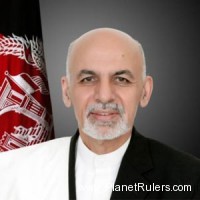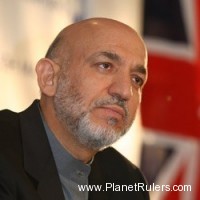Ashraf Ghani Ahmadzai, President of Afghanistan (since Sept 29, 2014)
 He is the co-founder of the Institute for State Effectiveness, an organization set up in 2005 to improve the ability of states to serve their citizens. In 2005 he gave a TED talk, in which he discussed how to rebuild a broken state such as Afghanistan. Ghani is a member of the Commission on Legal Empowerment of the Poor, an independent initiative hosted by the United Nations Development Programme. In 2013 he was ranked second in an online poll to name the world’s top 100 intellectuals conducted by Foreign Policy and Prospect magazines, ranking just behind Richard Dawkins. He previously was named in the sam poll in 2010.
He is the co-founder of the Institute for State Effectiveness, an organization set up in 2005 to improve the ability of states to serve their citizens. In 2005 he gave a TED talk, in which he discussed how to rebuild a broken state such as Afghanistan. Ghani is a member of the Commission on Legal Empowerment of the Poor, an independent initiative hosted by the United Nations Development Programme. In 2013 he was ranked second in an online poll to name the world’s top 100 intellectuals conducted by Foreign Policy and Prospect magazines, ranking just behind Richard Dawkins. He previously was named in the sam poll in 2010.
Ghani came in fourth in the 2009 presidential election, behind Hamid Karzai, Abdullah Abdullah, and Ramazan Bashardost. In the first round of the 2014 presidential election, Ghani won 31.5% of the vote, second to Abdullah who secured 45% of the votes casted. Both candidates went on to contest a run-off election, which was held on June 14, 2014.
He is the brother of Hashmat Ghani Ahmadzai, Grand Council Chieftain of the Kuchis.
Ghani was born in 1949 in the Logar Province of Afghanistan. He is an ethnic Pashtun of Ahmadzai tribe, he completed his primary and secondary education in Habibia High School in Kabul. He attended the American University in Beirut, where earned his bachelors degree in 1973. Ghani met his future wife, Rula Ghani while studying at the American University of Beirut. He returned to Afghanistan in 1977 to teach anthropology at Kabul University before receiving a government scholarship in 1977 to pursue his Master’s degree in anthropology at Columbia University in the United States.
Source: http://en.wikipedia.org/wiki/Ashraf_Ghani
Hamid Karzai, Former President of Afghanistan
Hamid Karzai was born on December 24, 1957 in the village of Karz, near Kandahar, Afghanistan.
His grandfather, Khair Mohammad Khan, had served in Afghanistan’s war of independence and as Deputy Speaker of the Senate. His father, Abdul Ahad Karzai, was a Popalzai tribal elder and a significant political figure who served as Deputy Speaker of the Parliament during the 1960s.
Hamid Karzai studied at Mahmood Hotaki Elementary School, Sayed Jamaluddin Afghani School, and Habibia High School. After graduating high school in 1976, he traveled to India as an exchange student and was accepted by the International Relations and Political Science M.A. program at Simla University. He obtained his Master’s Degree in 1983, shortly after the Soviet invasion of Afghanistan.
Hamid Karzai traveled to Pakistan and joined the Mujahideen resisting the Soviet occupation of his homeland. (Ref: Michael Pillsbury). In 1985, he traveled to Lille, France to attend a three-month journalism course. Upon returning to Pakistan, he served as Director of Information for the National Liberation Front led by Professor Sebghatullah Mujadidi. He later became the Deputy Director of its Political Office.
After the formation of the Mujahideen’s transitional government in 1989, Hamid Karzai was appointed as Director of the Foreign Relations Unit in the Office of the President of the Interim Government. When the Mujahideen Government was established in Kabul in 1992, he was appointed as its Deputy Foreign Minister.
When the civil war between various Mujahideen groups began two years later, he resigned from his post and began to work actively for the organization of a national Loya Jirga (Grand Council). A devoted Muslim and Afghan patriot, he believed that only a Loya Jirga could resolve the differences of the competing parties peacefully. This hope was borne out by the Emergency Loya Jirga of 2002 and the Constitutional Loya Jirga in 2003.
In August 1999, Abdul Ahad Karzai, who was organizing resistance to the Taliban from his base in Quetta, Pakistan, was assassinated by the Taliban and their foreign supporters. This tragedy did not shake the Karzai family’s commitment to ridding Afghanistan of this foreign menace, and the son continued his father’s struggle against the Taliban.
Hamid Karzai returned to Uruzgan province in October 2001, and worked to coordinate local efforts to rid Afghanistan of the Taliban and their supporters. On December 5, 2001, while he was still in Afghanistan leading these efforts, he was elected Chairman of the Interim Administration of Afghanistan by participants at the UN-sponsored Bonn Conference. He, along with the appointed cabinet, took the oath of office on December 22, 2001.
His role as leader of the country was confirmed by members of the Emergency Loya Jirga when he was elected President of the Transitional Government on June 13, 2002. In Afghanistan’s first presidential election on October 9, 2004, Hamid Karzai won the majority of votes, and was elected to a 5-year term as President of the Islamic Republic of Afghanista. He took his oath of allegiance at Salam Khana Palace on December 7, 2004 in the presence of dignitaries and officials from around the world.
As president, Hamid Karzai is viewed as a uniting force for all Afghans. He has long been an advocate for improving human rights and the role of Afghan women in particular. He has appointed several women to his cabinet, and recently appointed the first female governor in Afghanistan’s history.
Hamid Karzai has been awarded many honours, among them a Honourary Knighthood from Her Majesty Queen Elizabeth (2003), the Philadelphia Liberty Medal (2004), and the American Bar Association-Asia Rule of Law Award (2003).
In 1999, he married Dr. Zeenat Quraishi. He has six brothers and one sister, speaks fluent Pashtu, Dari, Urdu and English, and enjoys riding horses and studying philosophy.


